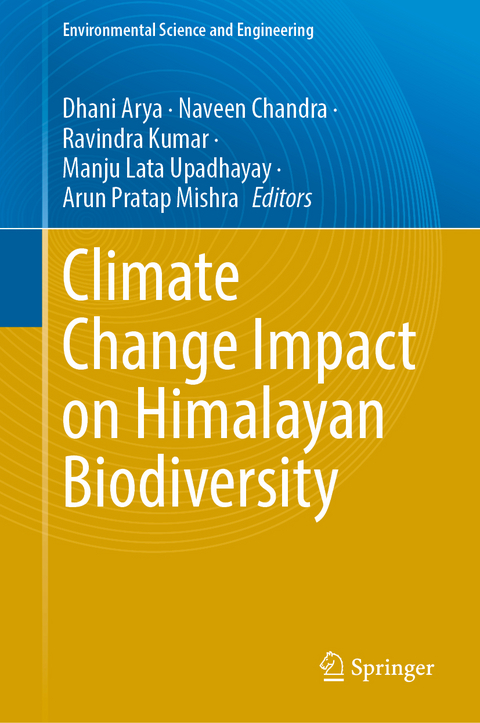
Climate Change Impact on Himalayan Biodiversity
Springer International Publishing (Verlag)
978-3-031-77148-4 (ISBN)
- Noch nicht erschienen - erscheint am 13.02.2025
- Versandkostenfrei
- Auch auf Rechnung
- Artikel merken
This book is an informative and profound book that explores the impact of climate change on the unique and delicate environment of the Himalayan region. The book meticulously examines the different plants and animals that live there and how they are affected by changing temperatures and weather patterns. The book showcases how species are changing their habits and distribution patterns and what this means for the future of the Himalayan environment. The book also provides practical suggestions for how local communities and policymakers can work together to protect the region's biodiversity for the future.
Overall, this book is an excellent resource for researchers and academics who are interested in learning more about the environmental impacts of climate change on the Himalayan region. The book is written in a clear and accessible manner, making it easy for anyone to understand the profound implications of climate change on this unique and sensitive environment.
Dr. Arya has done his M.Sc. from Kumaun University, Nainital, and Ph.D. from HNB Garhwal University, Srinagar, in Botany. Presently, he is working as Assistant Professor at the Botany department, Soban Singh Jeena University in Almora, Uttarakhand. He has published 28 research papers in national and international journals. His area of research is Ecology, Biodiversity Conservation, and Climate Change. Three research scholars have been awarded for their Ph.D. degree under his supervision. He has teaching and research experience of more than 12 years.
Dr. Naveen Chandra is serving as Assistant professor (guest faculty) at the Department of Botany, Soban Singh Jeena University, Almora. He did his postgraduation in 2016 and obtained Ph.D. degree from Kumaun University, Nainital, in 2022. Prior joining to university, he worked as Project Fellow in Uttarakhand Space Application Centre (USAC), Dehradun, for more than six years and since then working on different aspect of Himalayan biodiversity. His research interest includes plant taxonomy and ecology, vegetation ecology, invasion ecology, high-altitude physiology, medicinal plants, ecological modeling, and application of remote sensing (RS) and geographic information system (GIS) in biodiversity and forestry research. Till now, he has 26 research papers, 4 book chapters, and 2 scientific reports to his credit. His research has involved conducting surveys of high-altitude areas in the Western Himalaya to monitor vegetation pattern and perform long-term ecological monitoring.
Ravindra Kumar is Guest Faculty at the Department of Botany, Soban Singh Jeena University in Almora. He has published 11 research papers and 2 books chapters in different national and international journals. He has a teaching experience of more than 4 years. His research interest includes plant taxonomy, gymnosperm, high-altitude ecology, and ethnobotany.
Dr. Upadhyaya is Guest faculty at SSJ University, Almora, Uttarakhand. She has more than 15 years of teaching experience for department of Botany. She did her Ph.D. on the topic "Studies on leaf surface microfungi of Setaria italic Beauv, with reference to antagonism and disease development in Almora hills", and since then she has been involved in extensive research in the field of Plant Pathology and Ethnobotany. She has published more than 40 research papers in journals of national and international repute and has a patent and one book published in India. She has attended various workshops and seminars and also organized and conducted various webinars in her department. Her research projects have been funded by DST and CSIR, India. Her admiration for nature and efforts to restore the important of indigenous practices are well mirrored in her research work.
Mr. Mishra holds a postgraduate degree in Environmental Science from Hemwati Nandan Bahuguna Garhwal (Central) University, Uttarakhand, India. He has demonstrated exceptional proficiency in various areas, including Vegetation Characterization, Image Processing, Small Scale Mapping, Landscape Ecology, Species Distribution Modeling, Hydrological Modeling, and Water Quality. At present, Mr. Mishra's focus lies in the fascinating field of Alpine Ecology, where he is actively engaged in mapping, studying the distribution patterns, and assessing the threats faced by medicinal plants. His dedication to this critical area of research highlights his commitment to environmental conservation and sustainability. He has made valuable contributions to the scientific community through his publications, which include 20 research articles, 10 book chapters, 3 conference papers, and 1 technical report. He has gained valuable professional experience as Project Fellow at esteemed institutions like Uttarakhand Space Application Centre, Botanical Survey of India, and Rbased Services Private Limited. He has also completed a postgraduate diploma in RS&GIS (Remote Sensing a
Conservation Challenges and Adaptation Strategies for Himalayan Biodiversity in a Changing Climate.- Conservation Policies and Advocacy for Himalayan Biodiversity.- Climate Adaptation Strategies.- Conservation of Himalayan biodiversity vs sustainable development.- Forest Degradation and Carbon Sequestration.- Impact of climate change on Himalayan Ecosystem.- Impact of Climate change on traditional crops and Renewable energy source.- Population status and impact of climate change on threatened medicinal plants.- Glacial Lake Outburst Floods (GLOFs).- Landslides risk and Habitat Fragmentation.- The Vulnerability of Endemic Species in the Himalaya to Climate-Induced Habitat Loss.- Sustainable tourism development.
| Erscheint lt. Verlag | 13.2.2025 |
|---|---|
| Reihe/Serie | Environmental Science and Engineering |
| Zusatzinfo | X, 490 p. 300 illus., 100 illus. in color. |
| Verlagsort | Cham |
| Sprache | englisch |
| Maße | 155 x 235 mm |
| Themenwelt | Naturwissenschaften ► Biologie ► Ökologie / Naturschutz |
| Technik ► Umwelttechnik / Biotechnologie | |
| Schlagworte | biodiversity hotspot • Conservation Imperative • Ecological Resilience • Endemic species • Fragile ecosystems |
| ISBN-10 | 3-031-77148-6 / 3031771486 |
| ISBN-13 | 978-3-031-77148-4 / 9783031771484 |
| Zustand | Neuware |
| Haben Sie eine Frage zum Produkt? |
aus dem Bereich


